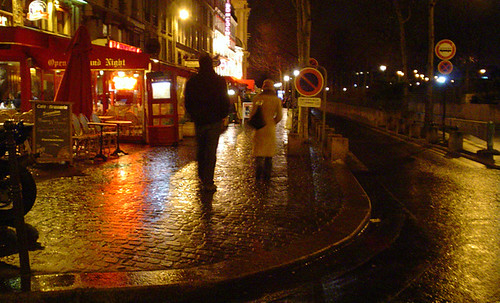I could almost taste the rain that hadn’t yet started, as I rode towards home trying to somehow cycle faster than is humanly possible. The phone rang and as per tradition, I couldn’t find the right pocket out of my million coat pockets, each filled with a different electronic device that only a citizen reporter would constantly carry on his person. That expression always cracks me up — carrying it on my person.
I decide to call the missed call back, as I could see it was Miss Ditta who just returned from her very long and extensively documented journey through Brazil. Hadn’t yet caught up with her since the return, though blogs pretty much keep friends up to date with each other in my experience:
ring ring…. (conversation takes place entirely in Portuguese, naturally)
D: Where are you? (a classic mobile phone greeting)
BM: Riding from Oost, heading back to the Oud West homestead.
D: Why not come to Prinsengracht number 1 zillion*.
BM: Sure, Im just about to hit the canals of the lovely Jordaan anyway.
D: Good. Ciao.
…click…

Course I had no idea where the house was and I certainly didn’t know who’s house it was, but what does that matter – it’s Sunday, you live in Amsterdam, you almost don’t need a coat today, and all the work you think you have to do can just wait.
I arrive pretty close to number 1 zillion and decide to continue the search on foot. As I walk towards the canal where I spot a bikerack, I catch the eye of a beautiful Dutch girl chatting with some people on a lovely houseboat. I smile like I’ve known her all my life and my mouth almost opens to start talking, when I notice she might not be looking at me, and I have no idea who she is. I notice a bunch of other people on the houseboat, and I think to myself: I miss the days where I used to hang out on houseboats. Around that same moment, a drunken German tourist, leading a group of old people, greets me in French. (why not?)
He asks: — are you from here?
And I reply: — yes I am, and its funny you’ve chosen French to communicate with me.
Then, in a mix of French, German, and English, he asks for a fantastic restaurant recommendation. I’m fiddling with my phone trying to call Ditta, and secretly envying the beautiful girl and all her friends partying on the houseboat. As I glanced up and down the canals thinking of a restaurant, voices from the houseboat start calling towards me:
Bicyclemark, what are you doing? Get over here!
I passed the German tourists onto a German speaker on the boat, and I started making the rounds giving hugs and kisses to all those present.
Oh you’re bicyclemark… soup mark who makes delicious Portuguese soup !, exclaimed another beautiful girl who could only be Ditta’s sister visiting from Slovakia.
I could go on. But at some point you’ll get tired of nationalities and languages and conversations and occasional references to some intriguing female I know nothing about. The moral of the story is: life is random.
Goodnight….. and Goodluck.
(*number changed for privacy purposes)



 We’ve spent a good amount of time comparing life and work in the Netherlands versus France. Naturally we’ve touched upon the demonstrations in the
We’ve spent a good amount of time comparing life and work in the Netherlands versus France. Naturally we’ve touched upon the demonstrations in the